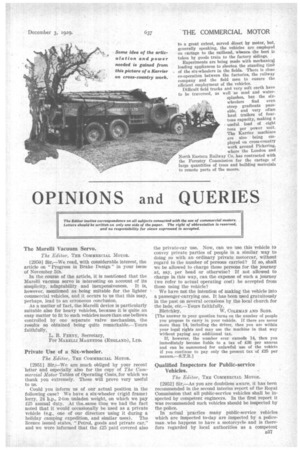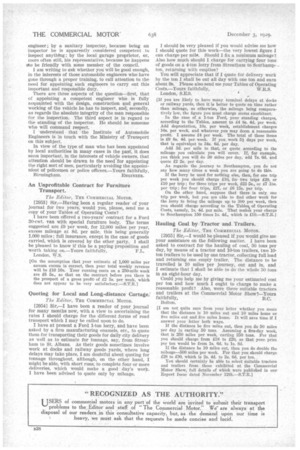OPINIONS and QUERIES The Marelli Vacuum Servo.
Page 63

Page 64

If you've noticed an error in this article please click here to report it so we can fix it.
The Editor, THE COMMERCIAL MOTOR.
[2950] Sir,—We read, with considerable interest, the article on " Progress in Brake Design" in your issue of November 5th.
In the course of the article, it is mentioned that the Marelli vacuum servo is interesting on account of its simplicity, adaptability and inexpensiveness. It is, however, mentioned as being suitable for the lighter commercial vehicles, and it occurs to us that this may, perhaps, lead to an erroneous conclusion.
As a matter of fact, the Morelli device is particularly suitable also for heavy vehicles, because it is quite an easy matter to fit to such vehicles more than one bellows controlled by one separate valve mechanism, the results so obtained being quite remarkable.—Yours faithfully, L. B. FEENy, Secretary, For MARELLI MAGNETOS ( ENGLAND), LTD.
Private Use of a Six-wheeler.
The Editor, THE COMMERCIAL MOTOR.
[2951] Sir,—We are much obliged by your recent letter and especially also for the copy of The Comniercial Motor Tables of Operating Costs, for which we thank you extremely. These will prove very useful to us.
Could you inform us of our actual position in the following case? We have a six-wheeler (rigid frame) lorry, 24 h.p., 2-ton unladen weight, on which we pay £25 annual duty. At the. same time we had the fact noted that it would occasionally be used as a private vehicle (e.g., one of our directors using it during a holiday camping expedition, and similar uses). The licence issued states, "Petrol, goods and private car," and we were informed that the £25 paid covered also
the private-car use. Now, can we use this vehicle to convey private parties of people in a similar way to doing EA with an ordinary private motorcar, without regard to the number of persons carried? If so, shall we be allowed to charge these persons for the journey at, say, per head or otherwise? If not allowed to charge in this way, can the expense of such a journey (we refer to actual operating cost) be accepted from those using the vehicle?
We have not the intention of making the vehicle into a passenger-carrying one. It has been used gratuitously in the past on several occasions by the local church for the lads, etc.—Yours faithfully, Bletchley. W. COLEMAN AND SONS.
[The answer to your question turns on the number of people you propose to carry in your vehicle. If there are never more than 14, including the driver, then you are within your legal rights and may use the machine in that way without paying any additional tax.
If, however, the number ever exceeds 14, then you immediately become liable to a tax of £36 per annum and can be summoned for unlawful use of the vehicle if you continue to pay only the present tax of £25 per anntint.—S.T.R.]
Qualified fnspectors for Public-service Vehicles.
The Editor, Tux COMMERCIAL MOTOR.
[2952] Sir,—As you are doubtless aware, it has been recommended in the second interim report of the Royal Commission that all public-service vehicles shall be inspected by competent engineers. In the first report it was recommended such vehicles should be inspected by the police.
• In actual practice many public-service vehicles which are inspected to-day are inspected by a policeman who happens to have a motorcycle and is therefore regarded by local authorities as a competent
engineer ; by a sanitary inspector, because being an inspector he is apparently considered competent to • inspect anything ; by the local garage proprietor, or, more often still, his representative, because he happens ito be friendly with some member of the council.
I am writing to ask whether you will be good enough, in the interests of those automobile engineers who have gone through a proper training, to call attention to the need for appointing such engineers to carry out this important and responsible duty.
There are three aspects of the question—first, that of appointing a competent engineer who is fully acquainted with the design, construction and general
working of the vehicle he has to inspect, and, secondly, as regards the absolute integrity of the man responsible for the inspection. The third aspect is in regard to the standing of the inspector. He should be someone who will command respect.
I understand that the Institute of Automobile Engineers is in touch with the Ministry of Transport on this subject.
In view of the type of man who has been appointed by local authorities in many cases in the past, it does
seem important, in the interests of vehicle ow-ners, that attention should be drawn to the need for appointing the right sort of men, particularly avoiding the appointm'ent of policemen or police officers.—Yours faithfully, Birmingham. ENGINEER.
An Unprofitable Contract for Furniture Transport.
The Editor, THE COMMERCIAL MOTOR.
129531 Sir,—Having been a regular reader of your journal for two years, would you, please, send me a copy of your Tables of Operating Costs?
I have been offered a two-years' contract for a Ford 30-cwt. van with special furniture body. The terms suggested are £9 per week, for 12,000 miles per year, excess mileage at 8d. per mile, this being generally 1,000 miles ; full insurance, except in the case of goods carried, which is covered by the other party. I shall be pleased to know if this be a paying proposition and worth taking on.—Yours faithfully, F.L. London, W.8.
[On the assumption that your estimate of 1,000 miles per annum excess is correct, then your total weekly revenue will be £10 10s. Your running costs on a 250-mile week are £8 5s., so that on the contract before you there is the prospect of a gross profit of £2 5s. per week, which does not appear to be very satisfaetory.—S.T.R,1 Quoting for Local and Long-distance Cartage.'
The Editor, THE COMMERCIAL liVIOTOR.
[2954] Sir,—I have been a reader of your journal for many months now, with a view to ascertaining the rates I should charge for the different forms of road transport which I may be called upon to do.
I have at present a Ford 1-ton lorry, and have been asked by a firm manufacturing enamels, etc., to quote them for transporting their goods for daily city delivery as well as to estimate for tonnage, say, from Streatham to St. Albans. As their goods sometimes involve work at docks and railway goods yards, where long delays may take place, I am doubtful about quoting for tonnage throughout, although, on the other hand, I might be able, with short runs, to complete four or more deliveries, which would make a good day's work. I have been advised to quote only by mileage. I should be very pleased if you would advise me how I should quote for this work—the very lowest figure I can charge per mile. Should I fix a minimum mileage? Also how much should I charge for carrying four tons of goods on a 4-ton lorry from Streatham to Southampton, returning with empties?
You ,will appreciate that if I quote for delivery work by the ton I shall be out all day with one ton and earn about 9s. Please also send me your Tables of Operating Costs.—Yours faithfully, • W.R.S. London, S.E.9.
[If you are likely to have many terminal delays at docks or railway yards, then it is better to quote on time rather than mileage, as otherwise, the mileage being coinparatively low, the figure you must charge seems exorbitant. . In the case of a 1-ton Ford, your standing charges, according to the Tables, amount to £4 Ss. 4d. per week. Add depreciation, 10s. per week, establishment charges 10s, per week, and whatever you may deem a reasonable profit. I assume £4 per week. The total of those items is £9 8s. 4d. per week. If you work S days per week, that is equivalent to 34s. Eld. per day.
Add 3d. per mile to that, or quote according to the mileage you calculate you will cover. If, for example, you think you will do 30 miles per day, add 7s. 6d. and quote £2 2s. per day.
As regards the journey to Southampton, you do not say how many times a week you are going to do this.
If the lorry be used for nothing else, then, for one trip per week you should charge £16, Rr two trips £20, or £10 per trip ; for three trips per week, £23 5s., or 17 lbs. per trip ; for four trips, £27, or £6 15s. per trip.
On the other hand, suppose that there is only. One trip per week, but you are t:ble to find other work for the lorry to bring the mileage up to 300 per week, then you should charge according to the Tables of Operating Costs, namely, 1s. 4d. per mile. That raakes your charge to Southampton 150 times is. 4d., which is £10.—S.T.R.] Hauling Coal by • Tractor and Trailers.
The Editor, THE COMMERCIAL MOTOR.
[2955] Sir,—I would be pleased if you would give me your assistance on the following matter. I have been asked to contract for the hauling of coal, 50 tons per day, by means of a tractor and 10-ton trailers, two 10ton trailers to be used by one tractor, collecting full load and returning one empty trailer. The distance to be travelled is 10 miles per journey, out and in, and I estimate that I shall be able to do the whole 50 tons in an eight-hour day.
Could you help me by giving me your estimated cost per ton and how much I ought to charge to make a reasonable profit? Also, were there suitable tractors and trailers at the Commercial Motor Show?--Yours faithfully, B.C. Bolton.
[I am not quite sure from your letter whether you mean that the distance is 10 miles out and 10 miles home or five miles out and five miles home. It will save time if I answer your letter both ways.
If the distance be five miles out, then you do 50 miles per day in carting 50 tons. Assuming a five-day week, that is 250 miles per week, carting 250 tons. For that you should charge from £18 to £20, so that your, price per ton would be from Is, 6d. to 1s. 8d.
If the distance be 10 miles out, then you do double the mileage-500 miles per week. For that you should charge £28 to £30, which is 2s. 4d. to 2s. 6d. per ton.
You should certainly be able to select suitable tractors and trailers from those exhibited at the Commercial Motor Show, full details of which were published in our Report Issue dated November 12th.—s.T.R.]




















































































































